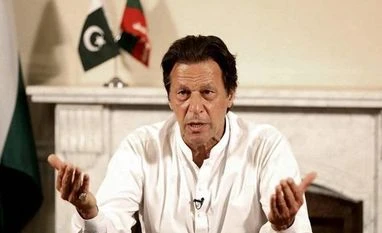Pakistan's economy to grow 1.5-2.5% in current fiscal, says report
Cash-strapped Pakistan's economy, which has been hit hard by the coronavirus pandemic, will turn around and grow 1.5-2.5 per cent in the current fiscal year, according to the country's central bank.
)
Pakistan Prime Minister Imran khan
Cash-strapped Pakistan's economy, which has been hit hard by the coronavirus pandemic, will turn around and grow 1.5-2.5 per cent in the current fiscal year, according to the country's central bank.
In its annual report for the fiscal 2019-20 released on Wednesday, the State Bank of Pakistan (SBP) said the nation's economy seems poised to pick up from where it was before the Covid-19 shock, The Express Tribune reported on Wednesday.
Pakistan's central bank has projected that the Covid-19 hit national economy will turn around and grow 1.5-2.5 per cent in the current fiscal year, the report said.
Like other nations, Pakistan's economy has been hit hard by the coronavirus effect that has so far claimed the lives of 7,248 people and infected 365,927 others in the country.
Pakistan has already been in a deep financial crisis and has been negotiating a bailout package from the International Monetary fund, apart from taking massive financial help from its close allies, including China.
Also Read
With the pre-Covid-19 improvement in macroeconomic fundamentals remaining intact and the strong policy response helping to cushion the shock, the economy seems poised to pick up from where it was before the Covid-19 shock, the SBP said.
In September, the central bank had projected Gross Domestic Product (GDP) growth of 2 per cent for the current fiscal year.
The government has set the GDP growth target at 2.1 per cent compared to contraction of 0.4 per cent in the previous fiscal year ended June 30, 2020.
The central bank voiced hope that the economy would take off partly with support from the government-backed housing and construction sector, which could activate at least 40 allied industries including paints and wood works, the report said.
It expected improvement in the economy in the backdrop of a couple of successful Covid-19 vaccine trials conducted by US and German companies.
Earlier, the business confidence rose in August as businesses applied for long-term subsidised loans for at least 338 new projects.
The central bank, however, cautioned that the pandemic would continue to pose risk to the economy till the vaccine was widely available around the world, including Pakistan.
Since the world was yet to get rid of the contagious disease, the SBP projected no growth in the inflow of remittances from overseas Pakistanis, almost flat exports but foresaw some increase in imports in the remaining eight months (Nov-Jun) of FY21.
Besides, the economy is likely to face inflationary pressure with increase in the import of steel for mass housing and construction, import of wheat and sugar to meet domestic shortfall and likely increase in electricity price, which had been due since before the Covid-19 outbreak in Pakistan in February.
In addition to this, the collection of targeted tax revenue will remain a challenge for the economic managers, according to the central bank.
Improvement in the economy is expected to come from a steady performance of agriculture and recovery in the services sector, especially finance and insurance, transport and communications.
Industrial performance is also expected to show a modest recovery, primarily on account of much-contained contraction in large-scale manufacturing (LSM) as compared to FY20, the report said.
More From This Section
Don't miss the most important news and views of the day. Get them on our Telegram channel
First Published: Nov 19 2020 | 1:22 PM IST
